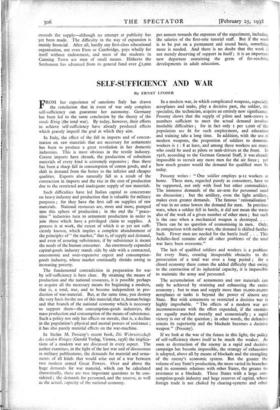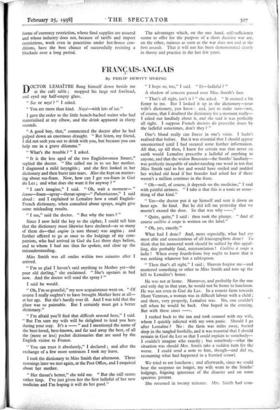SELF-SUFFICIENCY AND WAR
By ERNST LINDER FROM her experience of sanctions Italy has drawn the conclusion that in event of war only complete self-sufficiency can guarantee her autonomy. Germany has been led to the same conclusion .by the theory of the totale Krieg (the total war). By today, however, their efforts to achieve self-sufficiency have already produced effects which gravely imperil the goal at which they aim.
In Italy, the effect of the fall in imports and of concen- tration on raw materials that are necessary for armaments has been to produce a great revolution in her domestic industries. This is most obvious in the textile industry. Cotton imports have shrunk, the production of substitute materials of every kind is extremely expensive ; thus there has been a sharp fall in consumption of cotton goods, and a shift in demand from the better to the inferior and cheaper qualities. Exports also naturally fall as a result of the contraction in imports and the rise in the cost of production due to the restricted and inadequate supply of raw materials.
Such difficulties have led Italian capital to concentrate on heavy industry and production that is valuable for military purposes ; for they have the first call on supplies of raw materials. National resources are, more and more, pumped into this sphere of production ; in the end the " peace- time " industries turn to armament production in, order to join those which have a privileged claim to supplies. A process is at work, the extent of which is as yet not suffi- ciently known, which implies a complete abandonment of the principles of " the market," that is, of supply and demand, and even of assuring subsistence, if by subsistence is meant the needs of the human consumer. An enormously expanded capital-goods industry stands side by side with a contracted, uneconomic and over-expensive export and consumption- goods industry, whose market continually shrinks owing to increasing poverty.
The fundamental contradiction in preparation for war by self-sufficiency is here clear. By straining the means of production and the national resources, it is possible perhaps to acquire all the necessary means for beginning a modern, that is, a total, war, and to become independent in pro- duction of war-material. But, at the same time, you destroy the very basis for the use of this material, that is, human beings and that branch of the national economy which is necessary to support them—the consumption-goods industries, the mass production and consumption of the means of subsistence. Such a policy not only has effects on morale, that is, a decline in the population's physical and mental powers of resistance ; it has also purely material effects on the war-machine.
In Stefan M. Posseny's recent book, Die Wehrwirtschaft des totalen Krieges (Gerold Verlag, Vienna, 1938) the implica- tions of a modern war are discussed in every aspect. The author examines, in the light of the last war and of discussions in military publications, the demands for material and arma- ments of all kinds that would arise out of a war between two modern armed Great Powers. Over and above the huge demands for war material, which can be calculated theoretically, there are two important questions to be con- sidered ; the demands for personnel, and the reserve, as well as the actual, capacity of the national economy. In a modern war, in which complicated weapons, especially aeroplanes and tanks, play a decisive part, the soldier, the specialist, the technician, acquire an entirely new significance. Posseny shows that the supply of pilots and tank-crews in numbers sufficient to meet the actual demand involves insoluble difficulties ; for in fact only I per i,000 of the population are fit for such employment, and education and training take a long time. In addition, with the use of modern weapons, the proportion of soldiers to domestic workers is I : 8 at least, and among these workers are many who could be used as pilots or tank-drivers at the front. In 1918, according to the German General Staff, it was already impossible to recruit any more men for the air force ; yet how much greater would the demand for qualified men be today.
Posseny writes : " One soldier employs 9-12 workers at home. These men, regarded purely as consumers, have to be supported, not only with food but other commodities. The immense demands of the air-arm for personnel need no discussion ; but the artillery, even the light artillery, makes even greater demands. The famous ' rationalisation ' of war in no sense lowers the demand for men. In previous wars, when a soldier fell in battle, it did not mean the waste also of the work of a given number of other men ; but such is the case when a mechanical weapon is destroyed. . . . There can be no questiOn of economising in, men. Only, in comparison with earlier wars, the demand is shifted further back. Fewer men are needed for the battle itself . . This Achilles-heel remains after all other problems of the total war have been overcome."
The lack of qualified soldiers and workers is a problem for every State, creating insuperable obstacles to the prosecution of a total war over a long period ; for a closed economy there comes the added difficulty that owing to the contraction of its industrial capacity, it is impossible to maintain the army and personnel.
The accumulation of armaments and raw materials can only be achieved by straining and exhausting the entire economy ; but to man and supply more than to,000-2o,000 aeroplanes or tanks is beyond the power of almost any State. But with armaments so restricted a decisive war is highly improbable.. " The effects of a modem war are incommensurate with the effort expended, if the enemies are equally matched morally and economically ; a rapid victory is out of the question ; in other words, the defensive retains its superiority and the blockade becomes a decisive weapon " (Posseny).
If we look at the war of the future in this light, the policy of self-sufficiency shows itself to be much the weaker. , As soon as destruction of the enemy in a rapid and decisive campaign has become impossible, the strategy of exhaustion is adopted, above all by means of blockade and the strangling of the enemy's economic system. But the greater the volume of any State's production, the more varied its branches and its economic relations with other States, the greater its resistance to a blockade. Those States with a large con- sumption-goods industry and large reserves of capital, whose foreign trade is not choked . by .clearing-systems and other forms of currency restriction, whose food supplies are assured and whose industry does not, because of tariffs and import restrictions, work even in peacetime under hot-house con- ditions, have the best chance of successfully resisting a blockade over a long period. The advantages which, on the one hand, self-sufficiency seems to offer for the purpose of a short decisive war are, on the other, ruinous as soon as the war does not end at the first assault. That it will not has been demonstrated clearly in theory and practice in the last few years.

















































 Previous page
Previous page